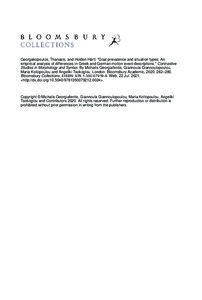| dc.date.accessioned | 2021-07-27T16:55:25Z | |
| dc.date.available | 2021-07-27T16:55:25Z | |
| dc.date.issued | 2020 | |
| dc.identifier | doi:10.17170/kobra-202107224394 | |
| dc.identifier.uri | http://hdl.handle.net/123456789/13038 | |
| dc.description | Early versions of this work were presented at the ‘International Contrastive Linguistics Conference 8’ which was held at the University of Athens (25–28 May 2017) and the ‘Language Comparison and Typology: German and the Mediterranean languages’ workshop, which was held at Humboldt University of Berlin (12 October 2018). | eng |
| dc.language.iso | eng | eng |
| dc.publisher | Bloomsbury Academic | |
| dc.rights | Urheberrechtlich geschützt | |
| dc.rights.uri | https://rightsstatements.org/page/InC/1.0/ | |
| dc.subject.ddc | 400 | |
| dc.title | Goal prevalence and situation types: An empirical analysis of differences in Greek and German motion event descriptions | eng |
| dc.type | Teil eines Buches | |
| dcterms.abstract | The aim of the current study is to investigate crosslinguistic differences in the encoding of motion events and the distribution of their constituent parts, that is, the manner as well as the path focusing mainly on the Goal component. In the abundant literature on the effect of the lexicalization pattern of a language (Satellite- versus Verb-framed), only a few studies have systematically taken into account the specific properties of the situation underlying a verbalization. With a focus on German and Greek, we analyse verbal descriptions of motion events presented in video clips and link the linguistic characteristics of the different verbalizations to the salience of the Goal point. We find that in situations containing highly evident Goals towards which the motion is targeted, German speakers tend to realize Goals more often than Greek speakers. This finding is complemented with a crosslinguistic examination of the inventory for expressing manner and path of motion as well as by an analysis of the type of information expressed in the verbalizations. We discuss both in the context of the continuum between Satellite- and Verb-framed languages. | eng |
| dcterms.accessRights | open access | |
| dcterms.creator | Georgakopoulos, Thanasis | |
| dcterms.creator | Härtl, Holden | |
| dc.publisher.place | London | |
| dc.relation.doi | doi:10.5040/9781350079212.0024 | |
| dc.subject.swd | Kontrastive Morphologie | ger |
| dc.subject.swd | Kontrastive Syntax | ger |
| dc.subject.swd | Neugriechisch | ger |
| dc.subject.swd | Deutsch | ger |
| dc.subject.swd | Bewegungsverb | ger |
| dc.subject.swd | Verbalisierung | ger |
| dc.type.version | publishedVersion | |
| dcterms.source.collection | Contrastive Studies in Morphology and Syntax | eng |
| dcterms.source.editor | Georgiafentis, Michalis | |
| dcterms.source.editor | Giannoulopoulou, Giannoula | |
| dcterms.source.editor | Koliopulu, Maria | |
| dcterms.source.editor | Tsokoglou, Angeliki | |
| dcterms.source.identifier | doi:10.5040/9781350079212 | |
| dcterms.source.identifier | eisbn:978-1-350-07921-2 | |
| dcterms.source.identifier | eisbn:978-1-350-07919-9 | |
| dcterms.source.identifier | isbn:978-1-350-07918-2 | |
| dcterms.source.pageinfo | 262–280 | |
| dcterms.source.series | Bloomsbury studies in theoretical linguistics | eng |
| kup.iskup | false | |

